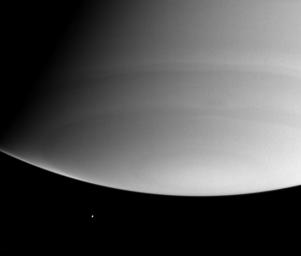
|
Ultraviolet Enceladus
- Click the image above for a larger view
- Full-Res JPEG (951 x 810) (22.7 kB)
- Full-Res TIFF (951 x 810) (446.5 kB)
Caption:
Looking beyond Saturn's south pole, this was the Cassini spacecraft's view of the distant, icy moon Enceladus on July 28, 2004. The planet itself shows few obvious features at these ultraviolet wavelengths, due to scattering of light by molecules of the gases high in the atmosphere. Enceladus is 499 kilometers (310 miles) wide.
The image was taken with the Cassini spacecraft narrow angle camera at a distance of 7.4 million kilometers (4.6 million miles) from Saturn through a filter sensitive to ultraviolet wavelengths of light. The image scale is 44 kilometers (27 miles) per pixel of Saturn.
Background Info:
The Cassini-Huygens mission is a cooperative project of NASA, the European Space Agency and the Italian Space Agency. The Jet Propulsion Laboratory, a division of the California Institute of Technology in Pasadena, manages the Cassini-Huygens mission for NASA's Office of Space Science, Washington, D.C. The Cassini orbiter and its two onboard cameras, were designed, developed and assembled at JPL. The imaging team is based at the Space Science Institute, Boulder, Colo.
For more information, about the Cassini-Huygens mission visit, http://saturn.jpl.nasa.gov and the Cassini imaging team home page, http://ciclops.org .
Cataloging Keywords:
| Name | Value | Additional Values |
|---|---|---|
| Target | Enceladus | Saturn |
| System | Saturn | |
| Target Type | Satellite | Planet |
| Mission | Cassini-Huygens | |
| Instrument Host | Cassini Orbiter | |
| Host Type | Orbiter | |
| Instrument | Imaging Science Subsystem (ISS) | |
| Detector | Narrow Angle Camera | |
| Extra Keywords | Atmosphere, Grayscale, Ultraviolet, Visual | |
| Acquisition Date | ||
| Release Date | 2004-09-23 | |
| Date in Caption | 2004-07-28 | |
| Image Credit | NASA/JPL/Space Science Institute | |
| Source | photojournal.jpl.nasa.gov/catalog/PIA06483 | |
| Identifier | PIA06483 | |
